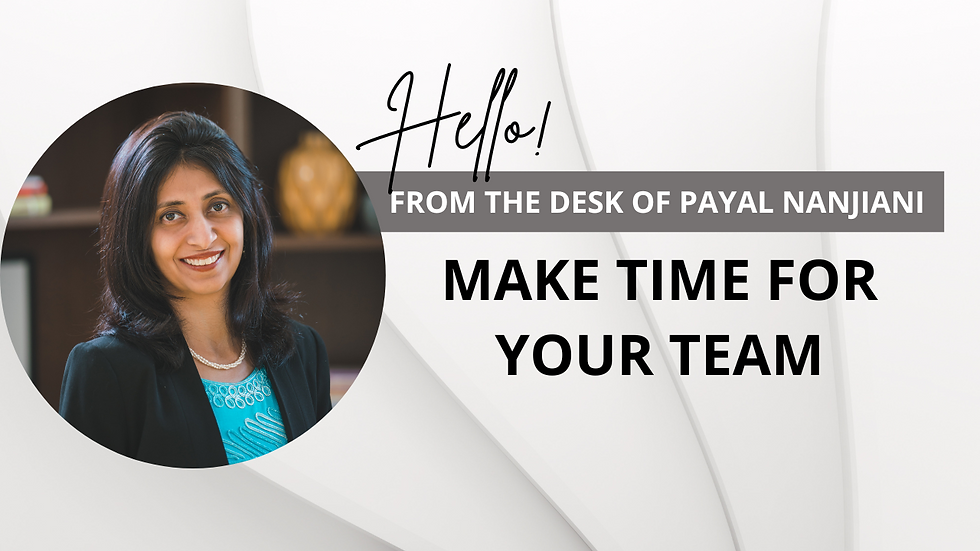MAKE TIME FOR YOUR TEAM
- ishikalatwal
- Feb 2, 2024
- 3 min read

It amazes me to see how many leaders respond negatively to my question when I ask them, 'do you conduct regular 1:1 meetings with your direct reports and team?'
They tell me they have kept an open-door policy where their team knows they can reach out anytime. And these are the same leaders who are later shocked to hear their employees quitting.
And some leaders conducting 1:1 meetings with their teams are doing it wrong, just like I did in the early years of becoming a first-time manager.
I remember, early on in my career, when I first got into the manager's role, there was a concept called management by wandering where managers would go around the office, check what was happening, and speak individually to people while on the go. That concept slowly developed into structured 1:1 meetings, and I began conducting these 1:1 meetings. But my attitude was, "be fast and finish telling me your problem so I can give you my solution." The 1:1 meetings focused more on what I wanted to say to my people rather than hearing them out.
Most leaders fall prey to the 'me' trap. They feel it's about their day, emotions, feelings, results, and thoughts. Later, I learned that these 1:1 are for my people. It's all about them.
Many leaders are consumed by the transactional nature of their job that they become more task-oriented than people-oriented. I have always encouraged my coaching clients to be leaders who get to know their employees more as human beings, not just task completers. Too often, leaders get so caught up in the day that they forget their reports are people with feelings.
In our age of hybrid working models, creating an emotional connection between you and your team is necessary.
An "open door" policy doesn't cut it. As a leader, you must reach out to your team, not the other way around.
To be a great leader and influencer, consider giving every employee you manage at least 30-60 minutes of your undivided attention. This is the most crucial time of your day. Your people must feel like they're heard and supported every week. Make it about them and their needs. Tell them your stories of success and failures. Become a mentor to them during these individualized discussions.
Leaders must know their reports personally as well as professionally. It means doing at least a little something for their birthday, knowing preferences that come up daily (she likes tea, not coffee), genuinely asking about their kids, their spouse, or their pets, and noticing when something is off. If someone is overly tired or uncharacteristically upset, inquire if they want to share and listen.
When you create a structured time for your 1:1, you will require two significant elements:
Preparation. I am not talking about the agenda or task you want to discuss. I am referring to emotional practice. If you do not prepare emotionally, your ego, negativity, stress, and tensions will arise during these individualized meetings. Dynamic equilibrium is your ability to stay clear-headed and see the situation as it is. It helps you bond deeply with your employees.
Reflection: Post-meeting reflection on your 1:1 should be addressed. Often when the meeting ends, that is where the creative ideas die or are put on the shelves with no further actions taken. Your team member might have shared a personal or professional concern. You must reflect on it, write it, see what help can be provided, and get back to them.
Meeting frequently and individually with team members can require a significant time investment but can help build great rapport.
A leader's job is never to get the results directly. A leader's job is to empower and inspire their people to work towards the outcome. And investing your time in your people through individualized meetings can go a long way in making you a great leader.
By you taking the time to connect individually with your team personally, you are sending out a strong message that you care about them. You are telling them through your actions that they are important to you.
During every coaching session, I emphasize to leaders the importance of connecting with their team beyond team offsites and lunch meetings. The individual attention that your team receives goes a long way in achieving great outcomes together.
Your Friend + Mentor
Do you have leadership challenges right now? #ASKPAYAL your burning leadership questions.

If you have a question or a challenge related to your career, self-development, and Leadership, this is your opportunity to Ask Payal.
Payal Nanjiani’s tools and techniques have helped millions of people across the globe to take their leadership and career to the next level. Share your question and Payal will be answering the most common questions on her Social media sites.











Comments